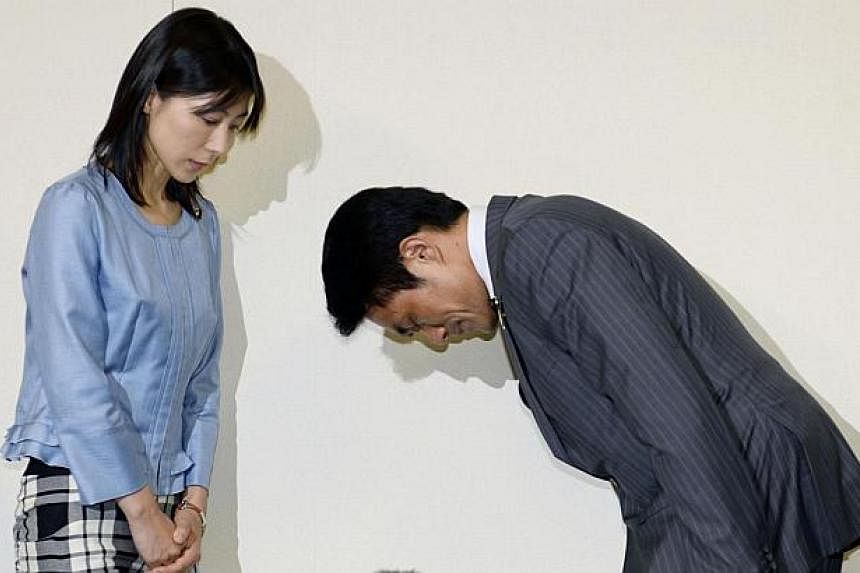TOKYO - Prime Minister Shinzo Abe has a dream. Sadly, it seems lofty and difficult to achieve.
The leader of Japan's conservative Liberal Democratic Party (LDP) wants to get more women to occupy leadership positions in the country's workforce as part of his growth strategy to revive the slumping economy.
The argument is that more women at the top will encourage more female participation in the workforce, which Japan needs to spur economic growth.
Hence, by year 2020, he wants 30 per cent of managerial positions to be occupied by women.
But given the severe crunch of "womanpower", an inadequate social support system for working women and widespread chauvinism, the target may remain a pipe dream.
The idea, first laid down 11 years ago by the then Junichiro Koizumi government, was resurrected by Mr Abe in June when he mentioned the need to encourage women to leadership positions and for them to continue in the workforce after marriage.
In a fast-aging society like Japan with its dwindling population figures, this seems all but a necessity.
"Women are our biggest potential. I hope you will show courageous action and bring about a society where women will shine," Mr Abe told a meeting of business leaders last month, urging them to increase the number of women in top positions.
To display his own commitment to the cause, the prime minister said he plans to hold a "female-focused" version of the Davos economic forum in Tokyo in September, where invitees will include prominent women like International Monetary Fund chief Christine Lagarde, and Mrs Cherie Blair, the lawyer wife of former British prime minister Tony Blair.
"Women have the greatest potential, and allowing them to demonstrate their full abilities is the core of our growth strategy…This will be a Davos meeting for women," he told Nikkei business daily.
If verbal persuasion fails, Mr Abe hopes legal means will bring some progress. A new law is expected to be put in place by year end that will require companies to draw up action plans to increase the share of women in their ranks.
Companies will also have to disclose the percentage of women in their senior managerial positions in securities reports, while those actively promoting careers for women may be rewarded with tax breaks and priority in tendering for government procurement projects.
Year 2013 official statistics show Japanese women occupied only 7.5 per cent of managerial positions in private companies with 100 employees or more, up 6.9 per cent from a year earlier. Moreover, their participation in the workforce is the second lowest among major developed countries at 48.1 per cent, according to UNDP 2012 figures. Canada was the highest at 61.6 per cent, while Singapore stands at 59.0 per cent.
Moreover, 60 per cent of Japanese women say they will stop working after giving birth because of the lack of support for working mothers, a recent survey showed.
In such a scenario, Mr Abe's plans seem like a spectacular stepping stone for Japanese women to pursue careers, even as tradition expects them to be stay-at-home mothers and housewives.
But not all are on board.
Nissan Motor chief executive Carlos Ghosn called Mr Abe's target "too ambitious". He said he was all for empowering women, but did not want to see women fail by having been promoted without sufficient experience.
The Mainichi Shimbun daily was sceptical.
"Making companies say how many female managers or directors they have, and policies like increasing the number of creches may bring some progress, but it will not achieve the 30 per cent target," the paper said.
Moreover, Japanese men are mostly reluctant to share the housework with their working wives.
According to government statistics, in households where both husband and wife work, male participation in housework (including child care and shopping) rose from 15 minutes in 1986 to 39 minutes in 2011. Meanwhile, female participation in housework came to almost 5 hours, or eight times as long.
Japanese women also have to contend with entrenched male chauvinism.
In June, politicians from Mr Abe's LDP hurled sexist gibes at female opposition lawmaker Ayaka Shiomura in the Tokyo assembly during a debate on assistance for pregnant women and young mothers.
Some 40 per cent Japanese in their 20s to 40s still believe a woman's place is in the home, according to a recent poll by the Meiji Yasuda Institute of Life and Wellness.
Given his incessant rhetoric about giving women more leadership positions, Mr Abe is expected to set an example when he reshuffles his 19-member Cabinet next month. But, his LDP has only 40 female lawmakers, out of a total of 410, and many are serving only their first terms. In contrast, the party has over 60 male lawmakers who have won re-election four times or more and who feel they deserve a Cabinet post.
Considering he was slow to react to the sexist gibes by his own party in the Tokyo assembly, and later took only a lukewarm stand against it, it has raised questions about the legitimacy of Mr Abe's commitment to using women to shore up Japan's dwindling workforce.
And given the narrow window of five years to make his dream a reality, Mr Abe will have a difficult time convincing the Japanese people that it is a good thing for women to work.
wengkin@sph.com.sg
Is Japan ready for more "woman power"?

Join ST's Telegram channel and get the latest breaking news delivered to you.
